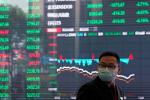The economic situation has deteriorated sharply since last December, and there is a risk of negative inflation over the next three years. Decisive action is thus called for, to forcefully relax monetary conditions. Against this background, the Swiss National Bank (SNB) is making another interest rate cut and acting to prevent any further appreciation of the Swiss franc against the euro. To this end, it will increase liquidity substantially by engaging in additional repo operations, buying Swiss franc bonds issued by private sector borrowers and purchasing foreign currency on the foreign exchange markets.
The SNB is lowering the target range for the three-month Libor by 25 basis points, narrowing it to 0-0.75%, with immediate effect. It will use all means at its disposal to gradually bring the Libor down to the lower end of the new target range, i.e. to approximately 0.25%. Thus, the Libor now has a narrower target range of 75 basis points, compared with 100 previously.
With these exceptional measures, the SNB is helping to cushion the effects of the economic and financial crisis, with the aim of limiting the risk of deflation. The SNB has a mandate to ensure price stability, while taking economic developments into account. This objective encompasses the prevention of both deflation and inflation. In carrying out its mandate, the National Bank will - as it has in the past - base its decisions on an inflation forecast.
The fourth quarter of 2008 saw a sharp slowdown in the world economy, which affected all countries simultaneously. There is every reason to believe that the deterioration has continued over the past two months. The Swiss economy is being hit hard by these developments, and they are affecting nearly all sectors of the economy. The export industry is bearing the brunt, however. As a result, the SNB is revising its GDP growth forecast downwards for the year under review. It now expects real GDP to fall by between 2.5% and 3%.
The rapid deterioration in the economic situation and the decline in commodity prices have also led to a clear downward revision of the inflation forecast. Average annual inflation will amount to -0.5% in 2009. With the measures decided today, the SNB is forecasting average annual inflation for the following two years of virtually zero. This inflation outlook calls for decisive action on the part of the SNB. By once again lowering the three-month Libor target range and acting to prevent any further appreciation of the Swiss franc against the euro, the SNB is seeking to counter the risk of deflation and of a dramatic deterioration in the economy.
Global economic outlook
Economic activity has declined sharply in the U.S., where consumption and exports have plummeted. The European economy has also undergone a significant contraction. The Asian economies, far from remaining unscathed by these developments, have also been heavily affected. The crisis that started in the financial markets of developed countries has spilled over to the real economy and is now impacting on the entire global economy. Against this background, the SNB has made a substantial downward revision to its growth forecasts for the major economies in 2009.
Swiss economic outlook
In Switzerland too, the economic situation has experienced a clear and rapid deterioration over the last six months. In the fourth quarter of 2008, real GDP dropped by 1.2% in annualised terms. While the contraction in economic activity appeared to be less pronounced in Switzerland than in the major European countries, this figure nevertheless obscures the extent of the collapse in global demand, in particular in the manufacturing industry, with the concomitant sharp drop in exports. Expenditure on equipment investment was cut significantly. Construction investment also saw negative growth, resulting in a significant decline in final demand.
The magnitude of the contraction in demand in the fourth quarter of 2008 was unexpected. The result was an involuntary swelling of inventories, which contributed artificially to growth in GDP. This phenomenon is likely to reverse in the first quarter of this year. Consequently, the SNB expects an increased contraction in GDP in early 2009.
Unemployment has begun to grow again since September 2008, a trend that will continue in the months ahead. The resulting climate of uncertainty will prompt households to exercise more caution and will lead to a slowdown in consumer spending. In addition, weak global demand is likely to weigh on Swiss exports, which will force companies to defer or reconsider their investment plans. By contrast, favourable financing conditions will probably continue to support investment in residential construction. Moreover, public spending will play a countercyclical role. Due to the deepening of the global recession, the SNB is now forecasting a contraction in GDP of between 2.5% and 3% for this year.
Changes in monetary and financial conditions
The SNB lowered the Libor target range decisively by 225 basis points over the course of the fourth quarter of last year. This monetary policy impetus will continue to feed through progressively to the economy. Short-term interest rates have dropped, and the interest rate curve has steepened. However, capital market risk premia have risen substantially since the collapse of Lehman Brothers, hampering the transmission of monetary policy stimuli. This is prompting the SNB to purchase Swiss franc bonds issued by private sector borrowers in order to bring about a relaxation of conditions on the capital markets.
The value of the Swiss franc has increased substantially since the beginning of the financial crisis in August 2007. This currency development has gained momentum since the National Bank's last assessment in December. Under the present circumstances, this represents an inappropriate tightening of monetary conditions. In view of this development, the SNB has decided to purchase foreign currency on the foreign exchange market, to prevent any further appreciation of the Swiss franc against the euro.
While M1 and M2 are registering strong growth rates, that of M3 remains moderate. In contrast, the monetary base almost doubled in one year. This development reflected the SNB's efforts to provide the interbank market with sufficient liquidity - as a response to the huge increase in the demand for liquidity brought about by the prevailing climate of uncertainty. If this demand had not been satisfied, the result would have been an undesirable rise in interest rates.
Since the beginning of 2008, the SNB has been conducting a qualitative survey with twenty banks which make up the bulk of the domestic loan market. The survey carried out in January 2009 shows that some banks have tightened their lending conditions slightly. Moreover, a growing number of banks are expecting to do so in the near future. While the statistics confirm lower growth in overall lending, they do not show an actual decline. Mortgage lending has remained unaffected by this development. The rate of growth in this area has risen since November, reaching 3.8% in January. It is too soon to tell whether this is an effect linked to the lowering of the three-month Libor, as has been observed in the past. By contrast, the growth rate in other loans has dropped sharply. It stood at 5.8% in January, compared with 20% a year earlier. In this category, lending is strongly cyclical and related to developments in the economy. The other loans, therefore, should decline in the near future. Overall, developments on the Swiss lending market have not followed the pattern observed abroad.
Inflation and inflation risks
After reaching a peak of 3.1% last July, inflation dropped back to 0.2% in February. This is attributable to the spectacular drop in the oil price from USD 145 to around USD 40 a barrel during the same period, as well as the appreciation of the Swiss franc. Inflation will continue to fall and will enter negative territory in the course of 2009. This is due to the prices of imported goods and services, in particular oil. They will be lower this year compared with last year's elevated levels. By contrast, inflation in domestic goods and services, despite weakening during the year, will remain positive in 2009.
For 2010 and 2011, inflation will remain very close to zero, because output will be below potential and unemployment will be high. Should the economy deteriorate more severely than expected, there would be a risk of negative inflation.
Monetary policy decision
A prolonged period of negative inflation is not compatible with the objective of maintaining medium-term price stability. Any tightening of monetary conditions is inappropriate in this depressed environment. By once again lowering the three-month Libor target range to 0-0.75%, by gradually bringing the Libor down to the lower end of this range, i.e. to around 0.25%, and by acting to prevent a further appreciation of the Swiss franc against the euro, the SNB is pursuing its expansionary monetary policy in order to support economic activity and limit the risk of deflation. The temporary narrowing of the Libor target range, which now stands at 75 basis points compared with the usual 100 basis points, is due to the fact that a negative Libor is not technically possible.
Inflation forecast chart
While the previous forecast (dash-dotted green curve) was based on the assumption that the three-month Libor would remain unchanged at 0.5%, the new curve is based on a Libor of 0.25%. It shows strongly negative inflation in 2009. This is, in essence, attributable to movements in the price of oil (base effect). In 2010 and 2011, inflation will remain very low, despite a Libor of 0.25%. This is due to the unfavourable economic outlook. Inflation will increase slightly at the end of 2011. This slight uptick in inflation is explained by the fact that a Libor of 0.25% does not represent an equilibrium level capable of guaranteeing price stability in the longer term.







Add a Comment
We encourage you to use comments to engage with other users, share your perspective and ask questions of authors and each other. However, in order to maintain the high level of discourse we’ve all come to value and expect, please keep the following criteria in mind:
Enrich the conversation, don’t trash it.
Stay focused and on track. Only post material that’s relevant to the topic being discussed.
Be respectful. Even negative opinions can be framed positively and diplomatically. Avoid profanity, slander or personal attacks directed at an author or another user. Racism, sexism and other forms of discrimination will not be tolerated.
Perpetrators of spam or abuse will be deleted from the site and prohibited from future registration at Investing.com’s discretion.